Pickleball To The Rescue
inpickleballme
on
March 1, 2022

PICKLEBALL TO THE
RESCUE
In California, firefighters are playing pickleball on and off duty to get fit, have fun and give back.

AS SPENCER ARMSTRONG, 50, says of his profession, “Once you become a firefighter, you basically inherit a second family and home.” In Armstrong’s case, that second home is Station 28 in Glendale, California, a city where he has fought fires for the past 23 years. Over the last five, he has also become an avid pickleball player, which led him to bring a portable net, paddles, and balls to work one day a few years back. With three shifts of four people, he felt it was a sport they could all easily play. He also sensed it would appeal to his fellow rescuers. “People who become firefighters tend to be very athletic and competitive by nature,” he says. “Pickleball harnesses all that with its fast pace, social group setting, strategy, and eye-hand coordination.”

Firefighters have fun setting up courts wherever possible, including in the driveway
Firefighters also have a required workout period during their shift to keep in shape and lessen injuries from the physically demanding nature of the job. Armstrong knew pickleball could tick that box and become their daily 8-to-10 a.m. group fitness training. The first time he set up the court, it was on the firehouse’s sloping driveway, where he stretched a hose across the bottom to catch errant balls from rolling into the street. After that initial game, an enthusiastic colleague ran to the phone to order his own equipment.
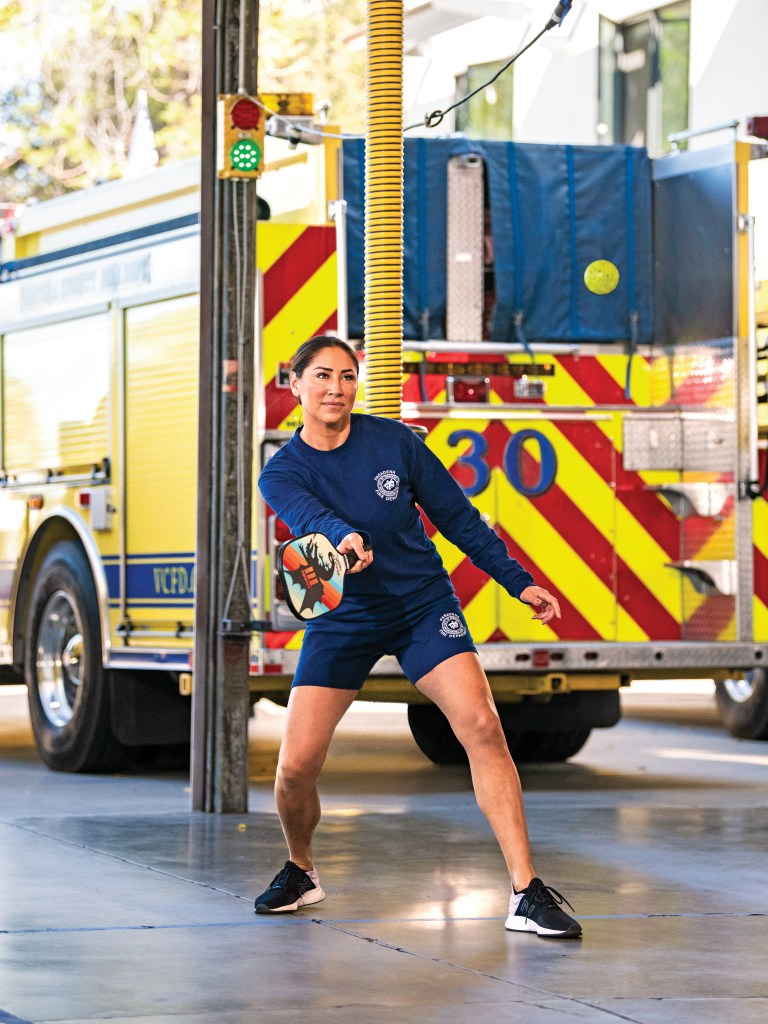
When a firefighter from Station 21 arrived one day to help fill in a shift, he proclaimed excitedly, “I hear this is the station where pickleball is played!” That firefighter then introduced the game to his colleagues at Station 21. Next, it started being played at Station Now four of Glendale’s nine firehouses have pickleball courts. Or as one firefighter, Christina Terrazas, 42, says of the sport that was introduced at her fire station in Pasadena close to a year and a half ago, “Pickleball has spread like wildfire at stations out here.”(No pun intended!)
In fact, so many firefighters are now playing the sport when off duty that Armstrong is currently organizing a pickleball league for nine California fire departments spanning from Alhambra to Ventura with a fellow firefighter, Jason Morales, 40. “We hope to start playing in March 2022, with a different department hosting each week on public courts in their area,” says Armstrong, who also plans to organize tournaments.
“PICKLEBALL IS VERY SOCIAL AND I AM ALWAYS LEARNING SOMETHING. I LOVE THE FINESSE OF THE SPORT.”
—JOSE RAMIREZ, VENTURA COUNTY FIRE STATION 45
For Armstrong, these tournaments would be a way to raise money for charities, including the Firefighters Quest for Burn Survivors, a nonprofit that raises funds for local burn centers, foundations, and the families of survivors. Armstrong knows firsthand what it is like to be injured in the line of duty, having recovered from third-degree burns on both his feet in 1996. “At the time, the Quest people visited me in the hospital to see if I needed any financial help,” he recalls. “I didn’t, but I got to learn the importance of their organization.”
Firefighter Jeff Golden, 41, already knows how money raised from a pickleball tournament can help those in their profession. Three years ago—one year after he discovered the sport—he organized a tournament for the 33 fire stations in Ventura (he works at a station in Thousand Oaks), with all the proceeds going to the Ventura County Fire Department Widows, Orphans & Assistance Fund, a nonprofit dedicated to helping the families of fire department members facing a crisis, such as an injury or death in the line of duty. “It was a huge hit,” he says, adding he is now eager to take part in Armstrong’s league and tournaments.

In 2019, the 33 fire stations in Ventura County organized a charity pickleball tournament
When asked why he thinks pickleball is so popular among his colleagues, Golden has two words: cardio and camaraderie. Jose Ramirez, 43, another Ventura firefighter whom Golden plays pickleball with off duty, agrees: “I decided to be a firefighter because I love to be physical and meet people. This game has those same two components. It is very social and I am always learning something. I love the finesse of the sport.”
Half the fun of pickleball for the firefighters, says Golden, is creating the court (in Thousand Oaks, half of the eight stations have courts). “All the courts are ad hoc. None are official,” he says. “We set ours up in the apparatus room and there is a storm drain in the middle of it.”
“WE LIKE TO PLAY TOGETHER AND TAKE ON THE MEN. YOU ALWAYS KNOW WHEN SOMEONE IS READY TO PLAY.”
—CHRISTINA TERRAZAS, A PASADENA FIREFIGHTER
Morales remembers creating their first court during Covid with his colleague Kevin Adair, 35, by taping down lines outside of their Pasadena station. “I tried to make the volleyball net into a pickleball net by bracing it with metal brackets, but the ball kept going through the net,” he remembers. He explains that after doing a bit of research, they finally pooled their own money to invest in proper equipment, learn the rules, and set up a court outside. (No tax dollars go toward pickleball expenses).
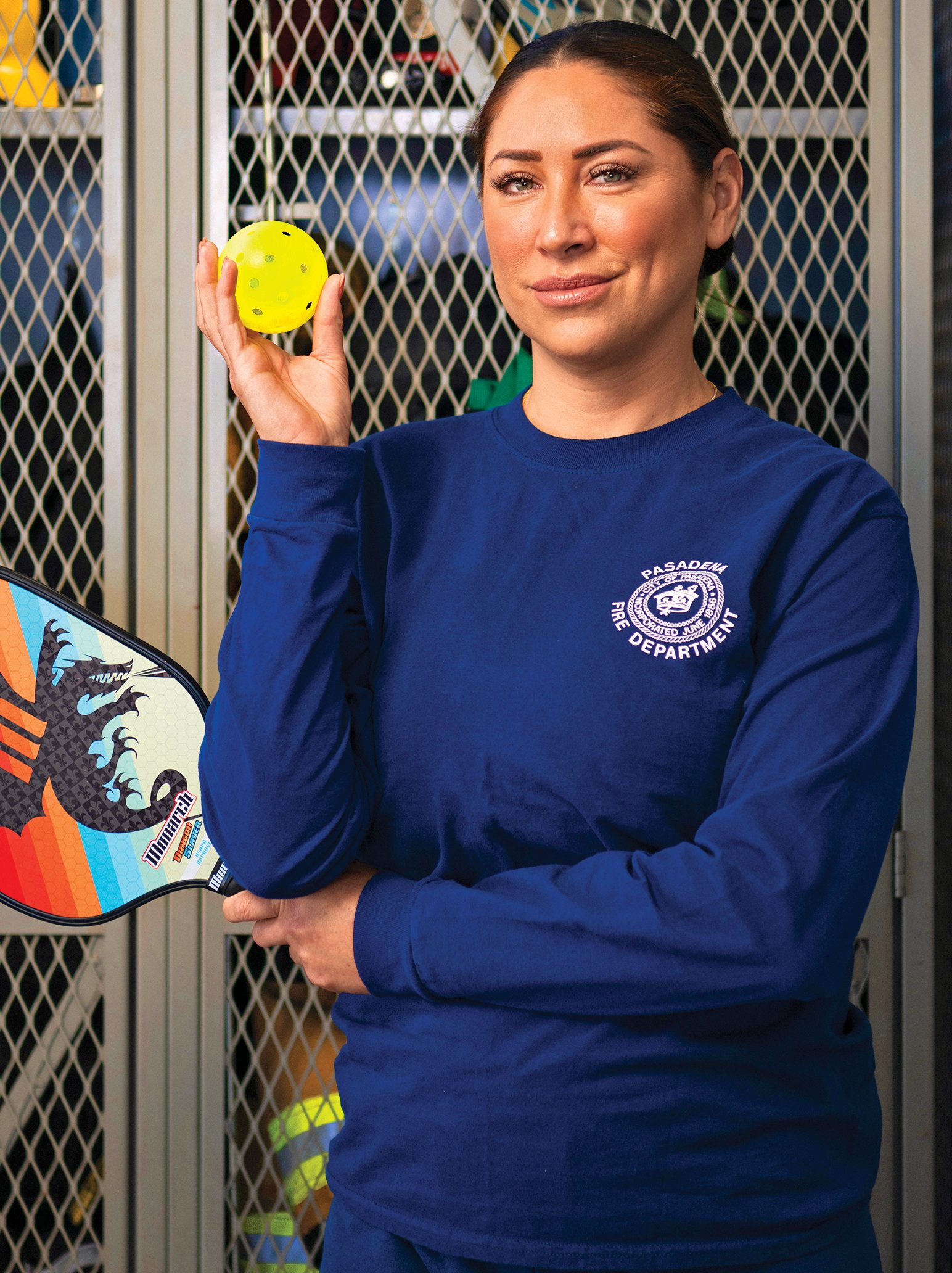
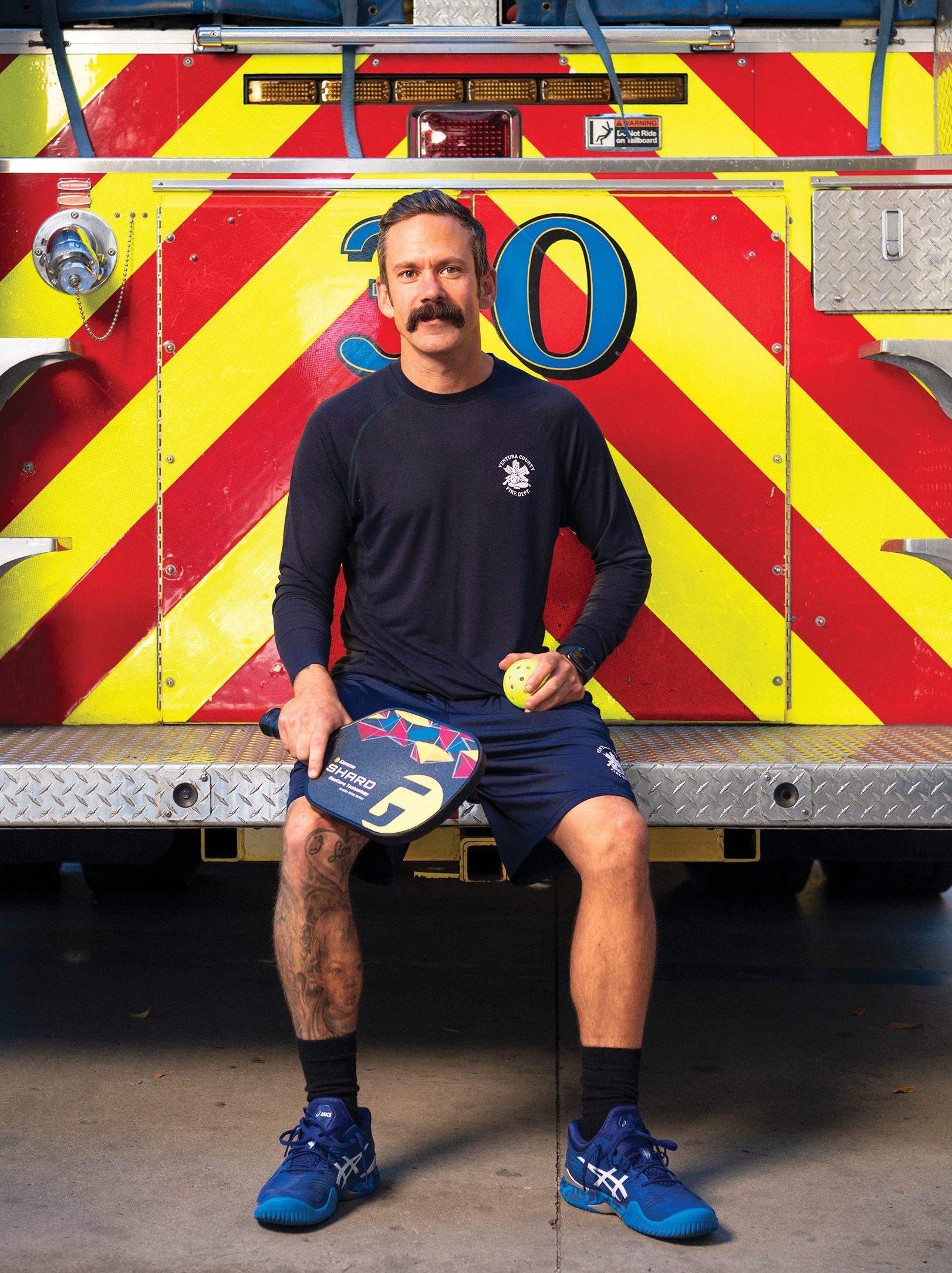
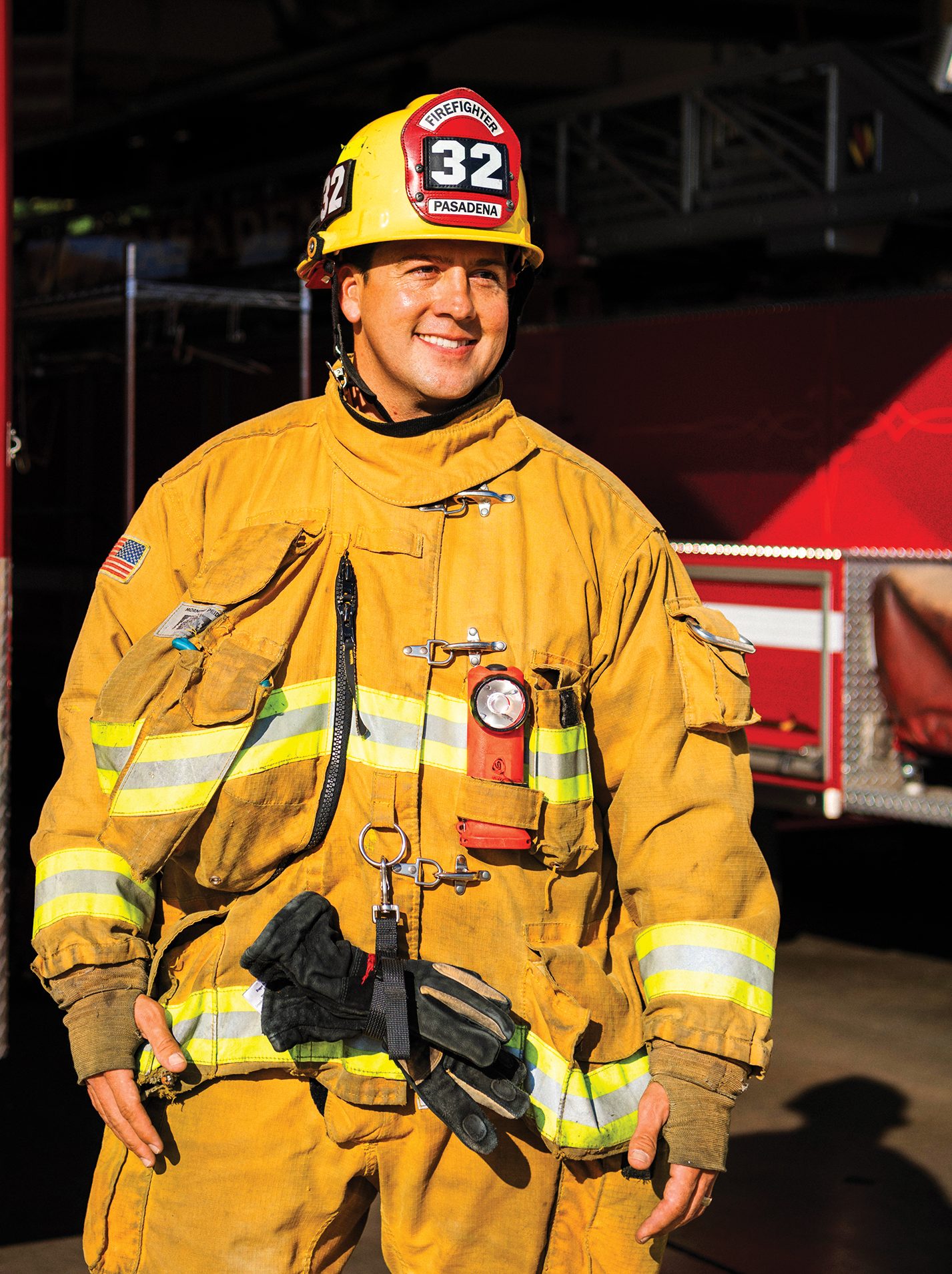

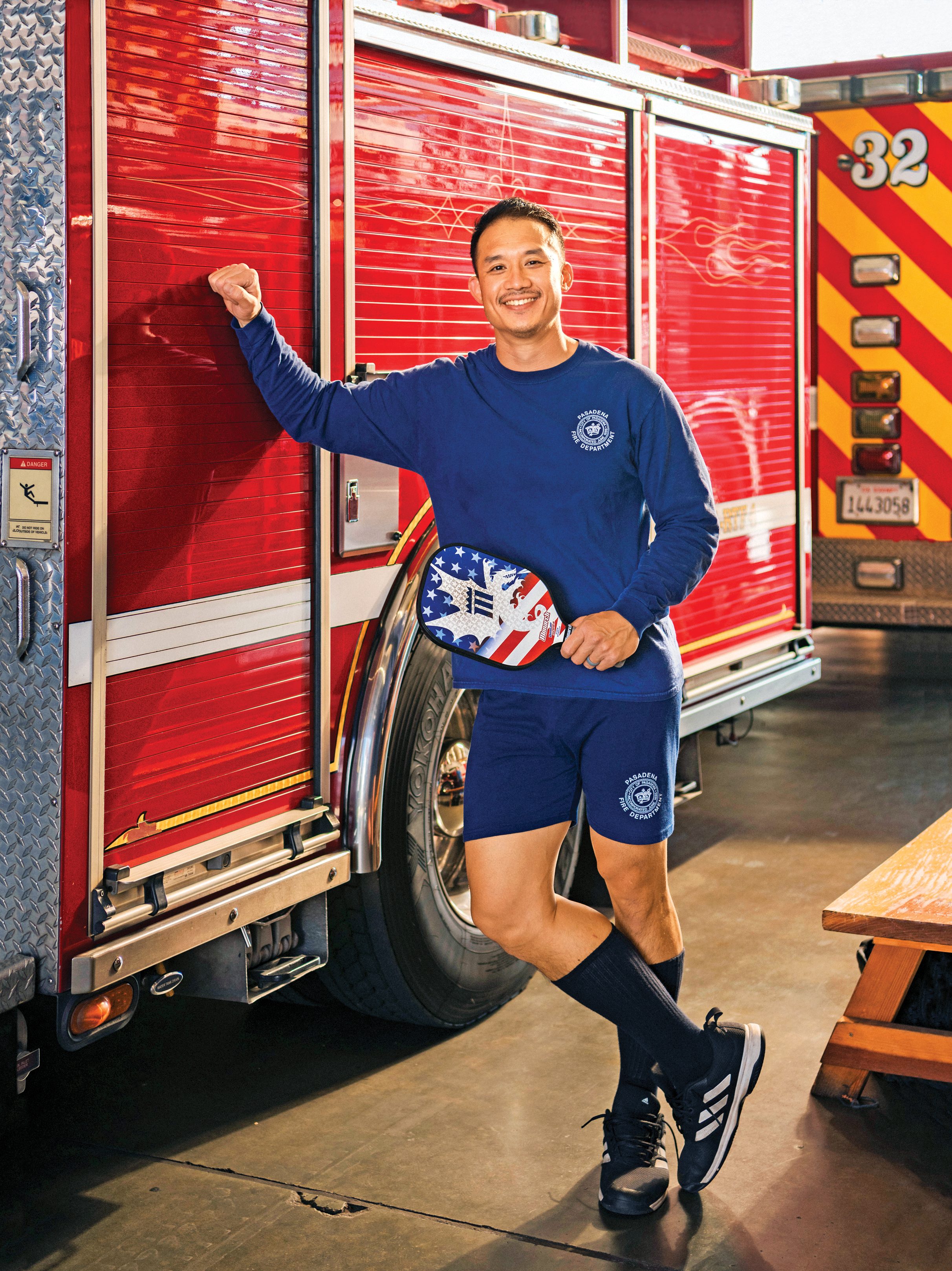
According to Golden, the foibles of different stations’ courts only add to the competition when firefighters from different departments play one another. But it is the daily games between firefighters in the same station that keep them the most focused and fit. Terrazas, a fire engineer, likes to play doubles with the one other woman, who happens to be the fire captain, who works in their Pasadena station. “We like to play together and take on the men,” she says, adding that at their fire station, the losing team often has to do a chore, such as washing all the dishes after dinner. “We also all have lots of pickleball swag,” she says. “You always know when someone is ready to play. We wear the headbands, the shirt, everything, and get serious about warming up.”
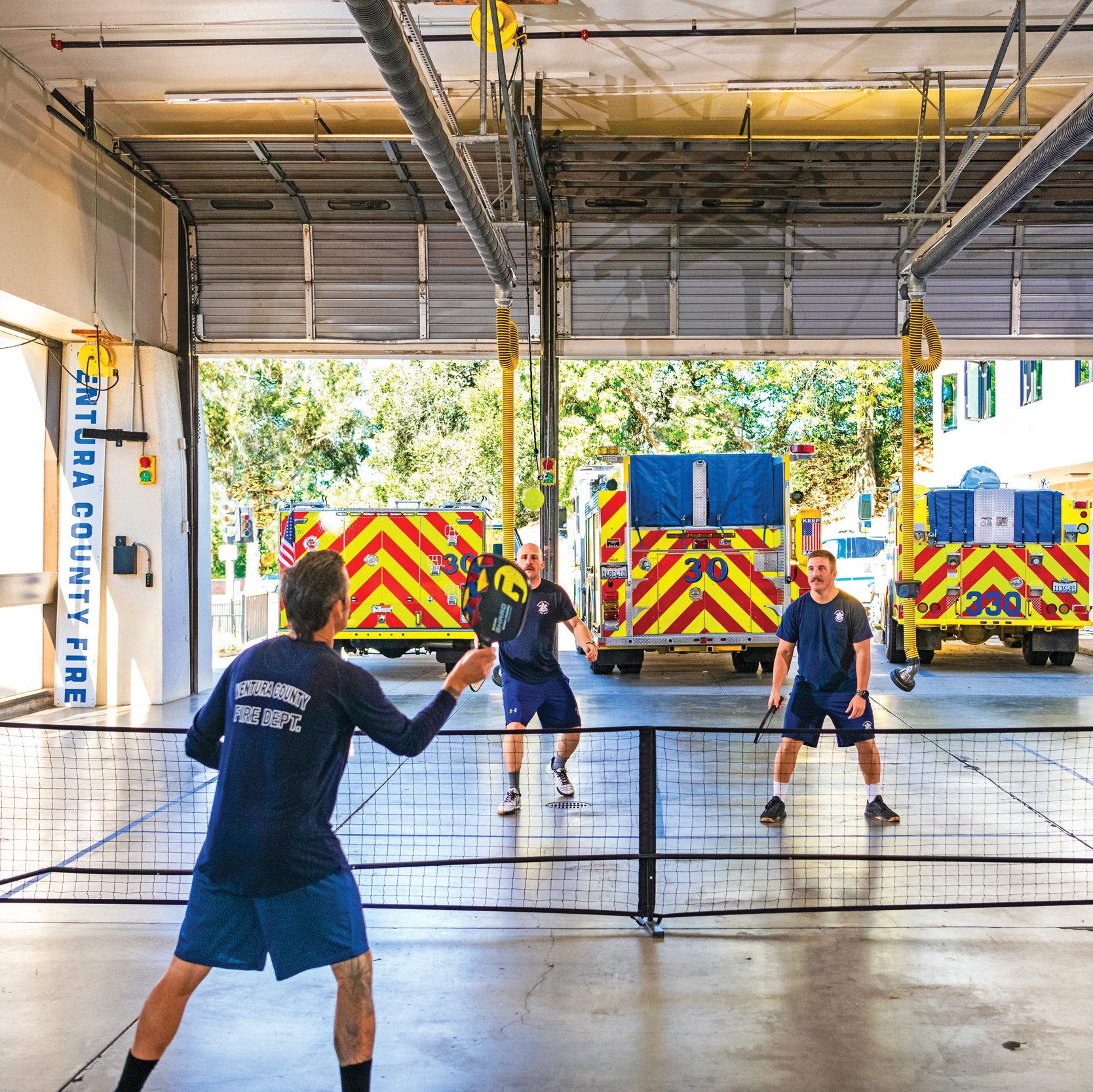
Ventura firefighters playing pickleball to stay in shape, lessen injuries, and meet their required workout period during shifts
Armstrong also attributes the sport’s popularity over basketball (his station’s previous go-to for physical training) to the fact that one is less likely to twist an ankle or get hit by an elbow playing pickleball. “It also burns tons of calories,” he says.
“FIREFIGHTERS TEND TO BE VERY ATHLETIC AND COMPETITIVE BY NATURE. PICKLEBALL HARNESSES ALL THAT.”
—GLENDALE FIREFIGHTER SPENCER ARMSTRONG
As is now a ritual on anniversaries of 9/11, firefighters from all over the country, including Armstrong, gathered in New York City this past fall to mark 20 years since that tragic day and to honor the lives of their fallen firefighters. “We ate and drank so much I gained eight pounds,” says Armstrong, citing how pickleball saved the day, helping him quickly lose the weight he gained on that trip.

Armstrong (above) and Morales (below) are now organizing a league with nine fire departments
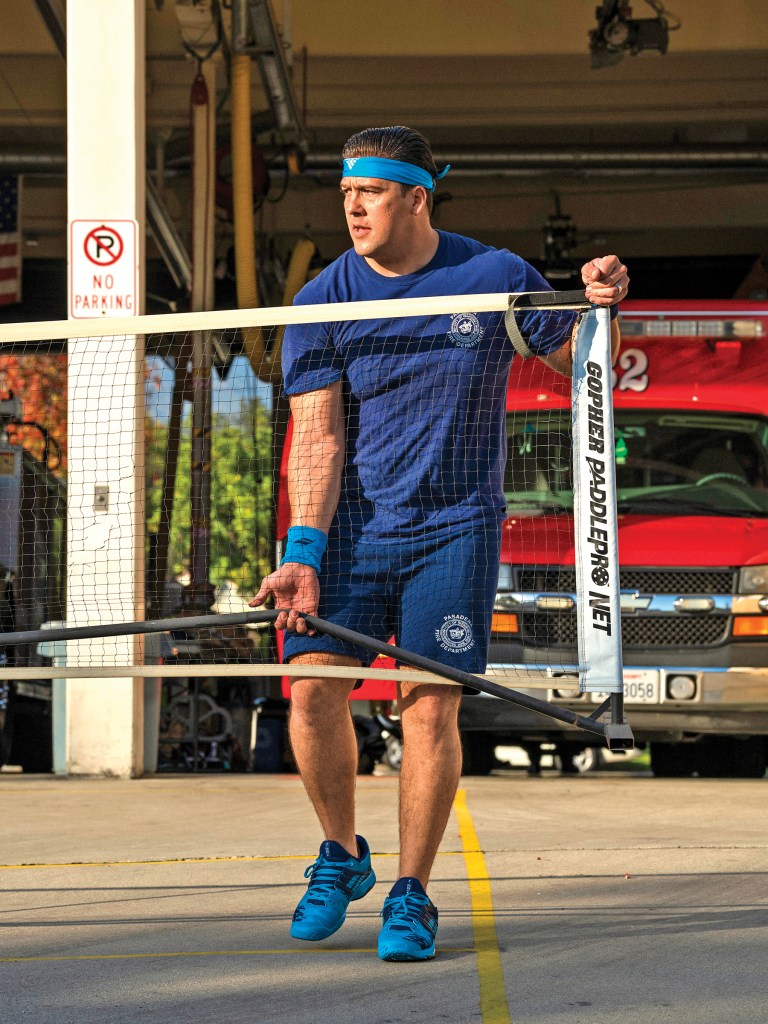
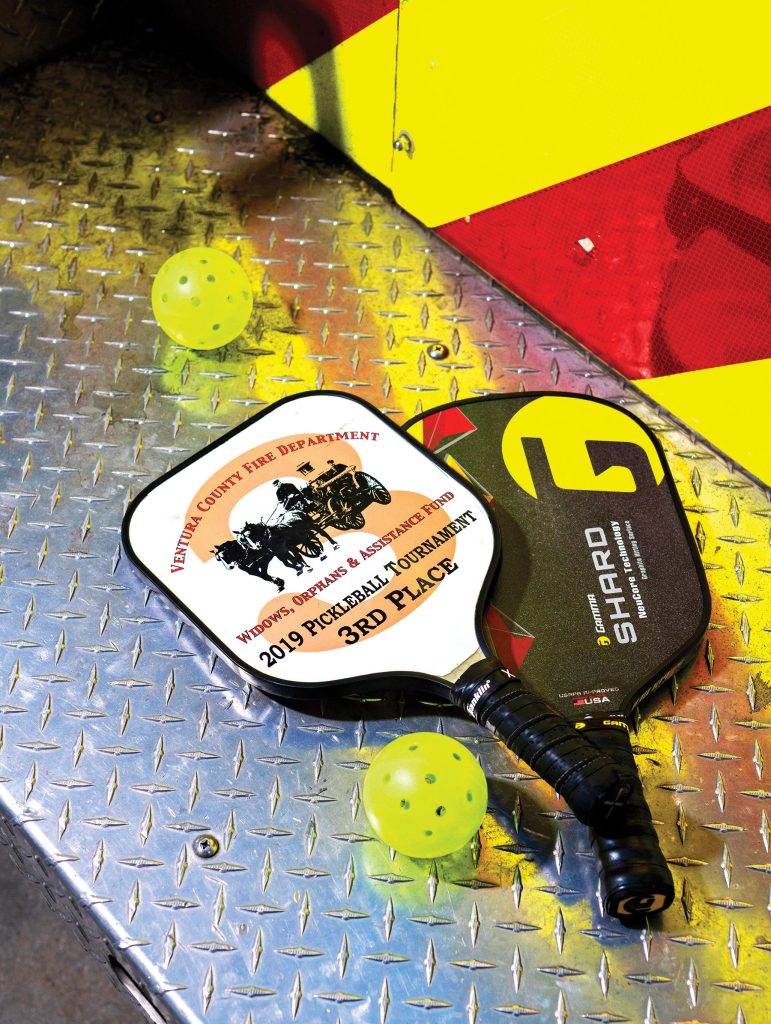
The sport has also led to a new camaraderie among firefighters off duty. Armstrong plays regularly in Ventu Park in Newbury Park, California, where on one occasion he learned that the person he was playing against was a retired firefighter. He turned out to be the first of many active and retired firefighters Armstrong would meet on the pickleball courts. Now he plays with fire chiefs and captains from Santa Barbara to Pasadena. “I am hoping to get the retired firefighters to join the league, too,” he says. Armstrong has a second nonprofit he hopes to support through tournaments: mental health and wellness for firefighters. “We see a lot doing our job and it can affect you deeply.”
“It’s really easy to drop that paddle and ball and get on the engine and do your job.”
—Michael Miller, a Firefighter in San Mateo
Morales believes playing pickleball does wonders for the morale of firefighters: “It is just a very inclusive sport. We all live together, and in Pasadena the fire department is very diverse. I love getting to know and live with people of different cultures. This sport fits our culture.”
Pickleball is also now bringing firefighters together statewide. It is one of the newest sports to be added to the event roster at the California Firefighter Summer Games, which this year is celebrating its 50th anniversary. Started in 1972, the weeklong event serves as a way for firefighters to get together and meet people from different departments. All funds raised are put back into charities in the host city, which changes each year. “In the beginning,” says Mike Pera, the current president of the games, “it was more about competition and brotherhood. The physical fitness part has become much bigger in the last 15 to 20 years.”
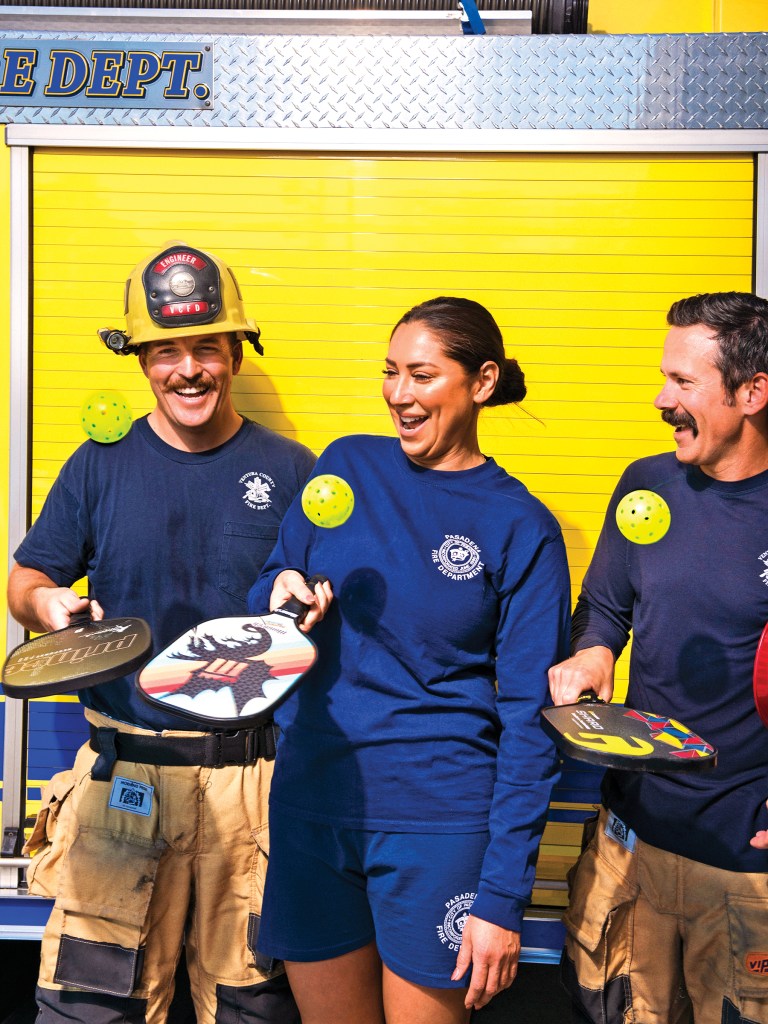
Pasadena firefighters
Initially, the games featured swimming, raquetball, softball, basketball, and track and field. By the early 1980s, at its peak, some 2,200 people were attending each summer.
Pera, who is now retired but was a firefighter for two decades in San Francisco, says that over the years interest in some of the mainstay events, like softball, have waned. “At one point, we had 72 softball teams; now we have 30 to 35,” he says. (Though the games were canceled the last two years due to the pandemic, they did hold one event in 2020, an outdoor softball tournament in Northern California.) Instead, says Pera, they began to add newer events such as CrossFit and a Frisbee golf competition at the request of the younger firefighters.
Enter Michael Miller, a 43-year-old firefighter in San Mateo, California, who called a board member for the games in 2017 and said, “I don’t know if you have heard of pickleball, but it is a great sport!”
That year—the first time pickleball was included in the games—Miller says they had just eight doubles teams. The following year, they had 14, and in 2019, there were 24 teams. Registration is not open yet for this year’s event in San Diego, but Miller thinks they may have a far greater number than ever before given the recent growth of the sport. “If we have 100 teams, I might have to create lower- and higher-level brackets of play for the first time,” he says excitedly. “The sport has gone crazy!”
“It’s just a very inclusive sport. I love getting to know and live with people of different cultures.”
—JASON MORALES, A STATION 32 PASADENA FIREFIGHTER
What’s more, the games are now open to those who live outside of California. Pera says they decided to geographically expand the games a few years ago. “If there are firefighters who want to come out from across the United States, they are welcome,” says Pera, noting that several years ago firefighters from Nevada participated.
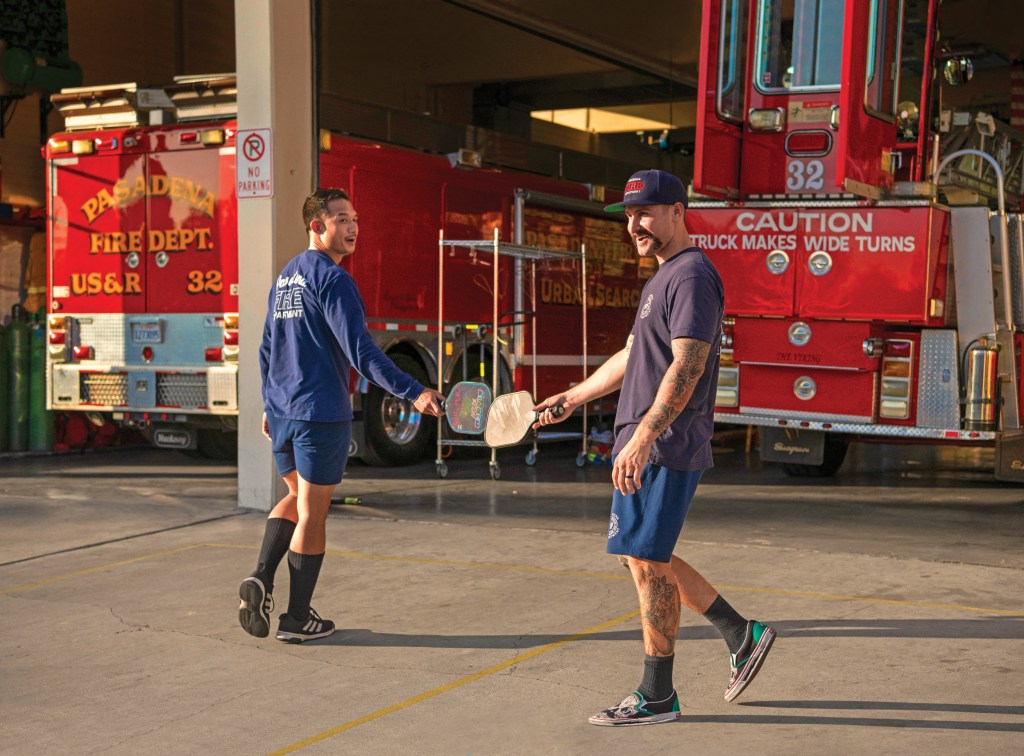
Miller thinks the sport is so popular among firefighters because “we don’t like to sit still.” But it also doesn’t distract from the rescuers’ work: “I don’t want to be exhausted when I go out. It’s really easy to drop that paddle and ball and get on the engine and do your job. It is low-impact and social, and it has so many intricacies. It’s a power game.”
For California firefighters, pickleball has given them not just a needed athletic outlet, but new friendships and a way to relieve the stress of their heroic work in a competitive yet healthy manner. Call it the rescuer’s perfect antidote.
- Category: Articles, Cover Story, FEATURES, True Dink
- Tag: Coverstory, Features, Firefighters, Inpickleball, Pickleball, Pickleballtotherescue

